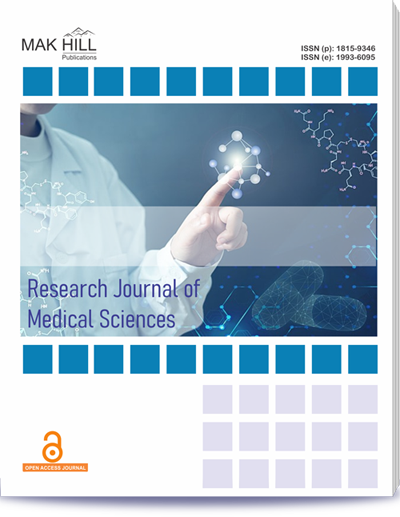
Research Journal of Medical Sciences
ISSN: Online 1993-6095ISSN: Print 1815-9346
Abstract
The primary goal of this study was to investigate the rate and underlying causes of recurrent miscarriages in tertiary care hospitals. A retrospective review of medical records from tertiary care hospitals was conducted. The sample consisted of 250 women who had experienced recurrent miscarriages. Relevant clinical, laboratory and imaging data were analyzed to determine potential etiological factors. The overall rate of recurrent miscarriages in the studied cohort was 100%, as all selected cases had experienced this condition. The primary identified causes and associated diagnostic/management practices were: Accounting for 36% of the cases. The use of hormonal therapy, such as progesterone, was documented in 28% of the patients. Anatomical abnormalities: Represented in 22% of the cohort. Surgical interventions, like hysteroscopy, were performed in 16% of these cases. Making up 16% of the recurrent miscarriages. Genetic counseling or testing was conducted for 22% of the patients. Contributing to 20% of the cases. Immune therapy, such as intravenous immunoglobulin, was administered to 18% of the affected individuals. Accounting for 6% of the cases, which may include infections, thrombophilia, lifestyle factors, or unspecified causes. Lifestyle and dietary counseling was provided to 12% of the patients, indicating broader application beyond just the 'other' category. Recurrent miscarriages are a significant concern in tertiary care settings. The diverse etiological factors underline the necessity for a comprehensive and multidisciplinary approach in the evaluation and management of women suffering from recurrent pregnancy losses. The findings from this study provide a roadmap for clinicians to prioritize investigations and tailor interventions.
How to cite this article:
Milind Babasahed Patil. Examining the Rate and Causes of Recurrent Miscarriages in Tertiary Care Hospitals.
DOI: https://doi.org/10.36478/10.59218/makrjms.2023.10.121.126
URL: https://www.makhillpublications.co/view-article/1815-9346/10.59218/makrjms.2023.10.121.126